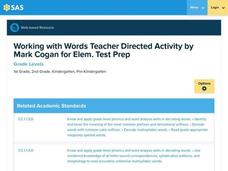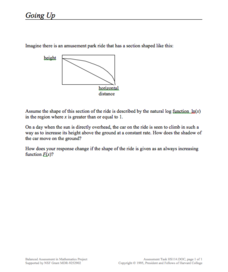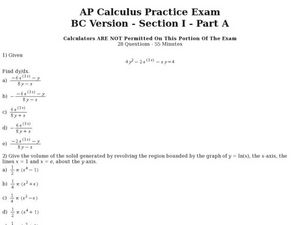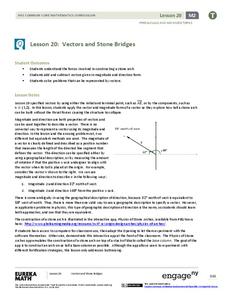Curated OER
Parametric Equations
High schoolers investigate the concept of parametric equations and practice taking the derivatives and then the Quotient Rule is proven. They prove the Quotient Rule while using the Chain Rule with the examples given in the lesson for...
Pennsylvania Department of Education
Working with Words Teacher Directed Activity by Mark Cogan for Elem. Test Prep
Students build word families. In this interactive language arts activity, students visit a website where they play a game creating word families. Students may print out their work when finished.
02 x 02 Worksheets
Inverse Variation
Discover an inverse variation pattern. A simple lesson plan design allows learners to explore a nonlinear pattern. Scholars analyze a distance, speed, and time relationship through tables and graphs. Eventually, they write an equation to...
Concord Consortium
Going Up
Going on up—and up and up! An open-ended task asks learners to model the movement of an amusement ride with parametric equations. They then analyze their equations to determine how the shadow of the ride's car moves as it rises at a...
Curated OER
The Right Angle
In this algebra worksheet, 11th graders solve word problems creating a right triangle. Students determine the point and direction this turn of ninety degrees occurs. There are 4 questions with an answer key.
Curated OER
Differentiation
Learners explore estimated and exact results for derivatives, tangent lines, implicit differentiation, and symbolic differentiation. The lesson provides examples with solutions and practice problems.
Curated OER
Calculus Practice BC
In this calculus worksheet, students solve functions using the derivatives. They calculate the volume where the graph is revolving around the x-axis, a line, the y-axis and where x=e. There are 28 questions.
Curated OER
Equations of Circles
Using Cabri Jr. students construct a circle and determine the equation of the circle they drew by finding the center and the radius. Students use the distance formula to derive the equation of their circle.
Curated OER
Measurement
Students explore the necessity for standards of measurement and measure length, volume, mass and angles. In this measurement lesson plan, students use their hand and foot to measure objects in the room. They compare their measurements to...
Curated OER
We've got the whole world in our hands
Students explore spatial sense in regards to maps about the globe. In this maps lesson plan, students label oceans, locate the continents and poles, follow directions, and explain the symbols on a map.
Curated OER
Making Paper
Students read about the history of paper production and make their own recycled paper. In this paper making lesson, students follow the directions to make paper from recycled paper. Students also learn about making paper from live plants.
EngageNY
Vectors and Stone Bridges
What does it take to build a stable arch? Pupils apply vectors and physics as they examine arched bridges and their structural integrity. They use vectors to represent the forces acting on the stone sections and make conclusions based on...
EngageNY
End-of-Module Assessment Task - Geometry (module 1)
Have you hit a wall when trying to create performance task questions? Several open-ended response questions require a deep level of thinking. Topics include triangle congruence, quadrilaterals, special segments, constructions, and...
EngageNY
Distance and Complex Numbers 2
Classmates apply midpoint concepts by leapfrogging around the complex plane. The 12th lesson in a 32 segment unit, asks pupils to apply distances and midpoints in relationship to two complex numbers. The class develops a formula to find...
EngageNY
The Graph of a Function
Mathematics set notation can be represented through a computer program loop. Making the connection to a computer program loop helps pupils see the process that set notation describes. The activity allows for different types domain and...
EngageNY
Solving Problems by Finding Equivalent Ratios II
Changing ratios make for interesting problems. Pupils solve problems that involve ratios between two quantities that change. Groups use tape diagrams to represent and solve classroom exercises and share their solutions.
EngageNY
Modeling Relationships with a Line
What linear equation will fit this data, and how close is it? Through discussion and partner work, young mathematicians learn the procedure to determine a regression line in order to make predictions from the data.
EngageNY
Prove the Pythagorean Theorem Using Similarity
Amaze your classes with the ability to find side lengths of triangles immediately — they'll all want to know your trick! Learners use the Pythagorean Theorem and special right triangle relationships to find missing side lengths.
EngageNY
Putting It All Together
Shuffle 'em up and deal! Learners practice operations with polynomials using cards they pass around the room. The activity works with pairs or individuals, so it offers great flexibility. This is the fifth installment in a series of 42...
EngageNY
Are All Parabolas Similar?
Congruence and similarity apply to functions as well as polygons. Learners examine the effects of transformations on the shape of parabolas. They determine the transformation(s) that produce similar and congruent functions.
EngageNY
Modeling a Context from Data (part 2)
Forgive me, I regress. Building upon previous modeling activities, the class examines models using the regression function on a graphing calculator. They use the modeling process to interpret the context and to make predictions based...
EngageNY
Characterize Points on a Perpendicular Bisector
Learn transformations through constructions! Pupils use perpendicular bisectors to understand the movement of a reflection and rotation. They discover that the perpendicular bisector(s) determine the line of reflection and the center of...
EngageNY
First Consequences of FTS
Challenge the young mathematicians to find the exact coordinates of a dilated point. The fifth segment in a 16-part series introduces the class to the converse of the Fundamental Theorem of Similarity. Scholars use the theorem to find...
EngageNY
Definition of Rotation and Basic Properties
Examine the process of rotating images to visualize effects of changes to them. The fifth lesson of 18 prompts pupils to rotate different images to various degrees of rotation. It pays special attention to rotations in multiples of 90...

























